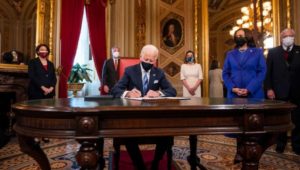
On his first full day in office as President, Biden announced two important immigration policy changes. The first policy change was the 100-day pause on deportations And the second one was that asylum seekers who attempt to enter the U.S. will no longer be part of a policy enacted under former President Trump that forced thousands of people to wait in Mexico for court hearings.
During his first day in office, President Biden also signed executive order which rolled back Trump-era immigration policies. The pause on deportations which begins today, is part of a review and reset of enforcement policies within Customs and Border Protection, Immigration and Customs Enforcement, and the U.S. Citizenship and Immigration Services agencies as the Biden administration develops its priorities.
According to a memo released by the Department of Homeland Security (DHS), “The moratorium applies to certain noncitizens ordered to be deported to ensure we have a fair and effective immigration enforcement system focused on protecting national security, border security, and public safety. That category excludes any immigrant who is suspected of terrorism or espionage, or otherwise poses a danger to the national security of the United States”.
Furthermore, DHS will cede to include people into the Migrant Protection Protocol program, mostly known as “Remain in Mexico” policy. In a different statement, DHS stated that the border restrictions due to the COVID-19 pandemic will remain in place. Such restrictions have caused he immediate deportation and expulsion of most unauthorized immigrants.
Eleanor Acer, the director of Human Rights First’s Refugee Protection program, praised Biden’s decision. “[We] urge the Biden administration to provide information as quickly as possible about the process for asylum seekers who have been subjected to this policy to be brought into the U.S. safely. Lives are on the line, and asylum seekers continue to be subjected to kidnappings, attacks and other targeted violence. The [Biden] administration should not adopt or extend the Trump administration’s misuse of public health authority and should not use public health as a pretext for expelling asylum seekers to places where their lives are in danger”.
The “Remain in Mexico” policy began in California and from there, expanded to the Texas- Mexico border in early 2019. This forced over 60,000 migrants back to the Mexican border towns which many contain high crime rates and little to no security.
On Wednesday, President Biden sent to Congress an immigration- reform bill which contains multiple longer-term agenda items, including a pathway to citizenship for millions of undocumented immigrants residing in the U.S. The announcement about the “Remain in Mexico” policy cautions that legislation applies to only to those people already living in the United States.

Recent Comments